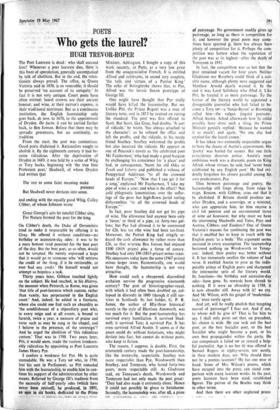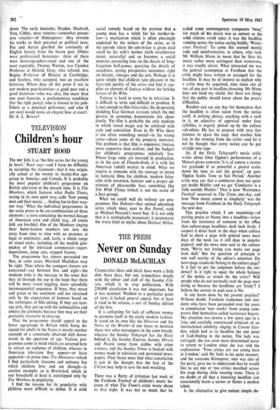o gets the laurel?
POETS HUGH TREVOR-ROPER
The Poet Laureate is dead: who shall succeed him? Whenever a poet laureate dies, there is this buzz of speculation, generally accompanied by talk of abolition. But in the end, the reten- tionists always prevail. The office, as Queen Victoria said in 1850, is so venerable; it should be preserved 'on account of its antiquity.'"In fact it is not very antique. Court poets have often existed; laurel crowns are their ancient honour; and wine, at their patron's expense, is their traditional nutriment. But as a continuous institution, the English laureateship only goes back, de jure, to 1670, to the appointment of Dryden. De facto, it can be carried farther back, to Ben Jonson. Before that there may be sporadic precursors, but no continuity, no tradition.
From the start, the post was contentious. Good poets disdained it. Rationalists sought to abolish it. By the eighteenth century it had be- conie ridicillous. After the deprivation of Dryden in 1689, it was held by a series of Whig or Tory hacks, beginning wth 'the true blue Protestant poet,' Shadwell, of whom Dryden had written that The rest to some faint meaning make pretence But Shadwell never deviates into sense.
and ending with the equally good Whig, Colley Cibber, of whom Johnson wrote Great George's acts let tuneful Cibber sing, For Nature 'formed the poet for the king. • On Cibber's death, the Duke of Devottshire tried to make' it respectable by offering it to . Gray. He offered it without conditions;--no birthday or accession-day odes: it was to be a mere honour (and pension) for the best poet of the day. But the best poet, as so often, Would not be tempted. He merely expressed a hope that it would go to someone who 'will retrieve the credit of the thing, if it be retrievable, or ever had any credit.' He himself would not attempt so hopeless a task.
Thirty years later, Gibbon touched lightly on the subject. He had reached, in his History, the moment when Petrarch, in Rome, was given 'that title of poet-laureate which custom, rather than vanity, has perpetuated in the English court.' And, indeed, he added in a footnote, where else could one find such an absurdity as 'the establishment of a stipendiary poet who, in every reign and at all events, is bound to furnish, twice a year, a measure of praise and verse such as may be sung in the chapel, and I believe in the presence, of the sovereign'? And he urged the abolition of 'this ridiculous custom.' That was in 1788. Two years later, Pitt, it would seem, made the custom irredeem- ably ridiculous by appointing as Poet Laureate James Henry Pye.
I confess a weakness for Pye. He is quite unreadable. He was a Tory MP who, in 1790, lost his seat in Parliament; so Pitt consoled him with the laureateship, to enable him to con- tinue his support of the administration by other means. Relieved by George III's madness from the necessity of half-yearly odes (which have never been revived), he produced, in 1801, an epic in six books, dedicated to the Prime NI „rum,: ameg 8.
Minister, Addington. I bought a copy of this work recently, in Paris, at a very low , price from the unappreciative French. It is entitled Alfred and celebrates, in sound tory couplets, 'the toils and virtues of a Patriot King.' The echo of Bolingbroke shows that, to Pye, Alfred was the heroic Saxon prototype of George III.
One might have thought that Pye really would have killed the laureateship. But, no.
Unlike Pitt, the Prince Regent was a man of literary taste, and in 1813 he insisted on raising 'the standard. The post was first offered to Scott. But Scott, like Gray, had doubts. 'A sort of ridicule,' he wrote, 'has always attached to the character'; so he refused the office and left the profits, and the ridicule, to his needy friend Southey. Southey welcomed the profits but also incurred the ridicule. He appears in one of Peacock's novels as 'the celebrated poet
Mr Feathernest,' ,who had made a good bargain by exchanging his conscience for 'a place' and
had, in consequence, 'burnt his old Odes to Truth arid Liberty and published a volume of Panegyrical Addresses "to all the crowned heads of Europe." "Now that I can get it for a song,' explained Mr Feathernest, 'I take my pipe of wine a year; and what is the effect? Not cold phlegmatic lamentations over the suffer- ings of the poor but high-flown jovial reeling dithyrambics "to all the crowned heads of Europe." ' In fact, poor Southey did not get his pipe of wine. The allowance had anyway been only a 'tierce,' or third of a pipe, i.e. forty-two gal- lons; but Pye had allowed it to be commuted for £26, less tax (the wine had been tax-free).
Moreover, the Patriot King had stingily re- duced the cash allowance by rather more than f26, so that whereas Ben Jonson had enjoyed £100 -(1616 prices) plus a tierce of canary.
Southey had only £96 (1813 prices) minus taxes. His successors today have the same (1967 prices) minus larger taxes. Economically, one would have thought, the laureateship is not very attractive.
How could such a cheapened, discredited archaism survive the progressive nineteenth century? The post of historiographer-royal, with which it had often been doubled up, col- lapsed in discredit in 1860 (though it still sur- vives in Scotland). Its last holder, G. P. R.
James, the author of fifty-three historical novels in the style of Harrison Ainsworth. was too much for it. But the poet-laureateship has survived every humiliation. It survived Shad- well;- it survived Tate; it survived Pye. It has even survived Alfred Austin. It seems as if the court could do without historians, who might deviate into fact, but cannot do without poets, who keep to fiction.
The reason, I suppose, is double. First, the nineteenth century 'made the poet-laureateship, like the monarchy, respectable. Southey was more respectable than Pye, Wordsworth than Southey, and Tennyson, who lasted forty-two years, ' more respectable still. As Gladstone said, on Tennyson's death, Wordsworth and Tennyson had not only made the post great: `They had also made it extremely clean.' Hence it could not possibly be given to Swinburne. Secondly, the laureateship was, after all, a piece
-vmsravrtu, frrse,*%
of patronage. No government readily gives up patronage, so long as there is competition for it; and however the great poets may some- times have spurned V, there has alWays been plenty of competition for it. Perhaps the com- petition was hottest when the reputation of the post was at its highest—after the death 'of Tennyson in 1892. •
In fact, the competition was so hot that the post remained vacant for four years. Neither Gladstone nor Rosebery could think of 'a suit- able name, although plenty were suggested and Matthew Arnold dearly wanted it. In the end it was Lord Salisbury who filled it. Like Pitt, he treated it as mere patronage. To the horror of the literary world he appointed a disreputable journalist who had failed to be- come a Tory MP—a 'banjo-Byron' as Browning called him—the vulgar, jingoist poetaster, Alfred Austin. Asked afterwards how he could possibly have done such a thing, the Prime Minister genially replied: 'Because he wanted it so much'; and again, 'No one else had applied for the laurel crown.'
It has taken two eminently respectable reigns to bury the shame of Austin's appointment. His 'poetry' was buried far sooner. But one little coincidence deserves notice. Austin's most ambitidus work was a dramatic poem on King Alfred, whose virtues, he said, had 'never been celebrated by any English poet.' He had evi- dently fprgotten his closest parallel among his own predecessors, Pye.
Thus between patronage and poetry, the laureateship still limps along, from reign to reign. Reason, with Gibbon, cries out that it be abolished. If Britain should produce an- other Dryden, and a sovereign, or a ministet, who can appreciate him, let him receive a civil list pension and an uncommuted tierce of wine ad hominent; but why must we have the intervening Shadwells and Tates, Pyes and Austins, Cibbers and Eusdens? One of Queen Victoria's reasons for continuing the post was that it enabled her to keep in touch with the English poets 'as a body.' The argument seems unsound in every assumption. The laureateship bestowed nothing on Wordsworth or Tenny- son: indeed, their poetry was better without it. It has immensely swollen the volume of bad verse. It enabled Austin to pose as the indis- putable prince of English poets and sharpened the internecine spite of the literary world. Its functions—the birthday and accession-day odes—have gone. Its rewards have shrunk to nothing. If it were an absurdity in 1788, it is now absurder still. Away with it? we cry. And Mr Wilson, with his gospel of 'modernisa- tion,' must surely agree.
And yet, will he really abolish that tempting morsel of patronage? I fear not. And if not, to whom will he give it? That is for him-to say. I shall only point out that, on precedent, his choice is wide. He can seek out the best poet, or the best Socialist poet, or the best Socialist who might become a poet, or his own best propagandist within the party. He can compensate a failed MP or reward a help- ful journalist. Age is no bar (it was offered to Samuel Rogers at eighty-seven), nor surely, in these modern days, sex. Why should there not be a poetess laureate? He has one near at band. Some of Mrs Wilson's poems, which have escaped into the press, can stand com- parison with many laureate works. In the past, poets laureate have been staid, established figures. The patron of the Beatles may think in other terms.
And then there are other neglected precis.- dents. The early laureates, Dryden, Shadwell, Tate, Cibber, were votaries—somewhat posses. sive votaries—of Shakespeare: they rewrote his works to their personal or political taste. Pye and Austin glorified the continuity of English history from the Saxon past. Others were professional historians: three of them were historiographers-royal and one of the most reputable, Thomas Warton, was Camden Professor at Oxford. Gray, who refused, was Regius Professor of History at Cambridge, and Southey, who accepted, was an excellent historian. Where does all this point if not to our modern poet-historian—a good poet and a good historian—who was also, like more than one poet laureate, a parliamentary candidate (for the right party); who is known to his pub- lishers as a punctual performer; and who (I am sure) would make an elegant bow at court: Dr A. L. Rowse?



































 Previous page
Previous page